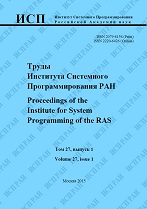|
This article is cited in 2 scientific papers (total in 2 papers)
Machine learning based activity learning for behavioral contexts in Internet of Things
M. Safyana, S. Sarwarb, Z. U. Qayyumc, M. Iqbalb, S. Lid, M. Kashife
a Lahore Government College University
b London South Bank University
c Allama Iqbal Open University
d University of West of England
e Özyeğin University
Abstract:
Ontology based activity learning models play a vital role in diverse fields of Internet of Things (IoT) such as smart homes, smart hospitals or smart communities etc. The prevalent challenges with ontological models are their static nature and inability of self-evolution. The models cannot be completed at once and smart home inhabitants cannot be restricted to limit their activities. Also, inhabitants are not predictable in nature and may perform “Activities of Daily Life (ADL)” not listed in ontological model. This gives rise to the need of developing an integrated framework based on unified conceptual backbone (i.e. activity ontologies), addressing the lifecycle of activity recognition and producing behavioral models according to inhabitant's routine. In this paper, an ontology evolution process has been proposed that learns particular activities from existing set of activities in daily life (ADL). It learns new activities that have not been identified by the recognition model, adds new properties with existing activities and learns inhabitant's newest behavior of performing activities through Artificial Neural Network (ANN). The better degree of true positivity is evidence of activity recognition with detection of noisy sensor data. Effectiveness of proposed approach is evident from improved rate of activity learning, activity detection and ontology evolution.
Keywords:
internet of things, activity recognition, activity learning, artificial neural networks.
Citation:
M. Safyan, S. Sarwar, Z. U. Qayyum, M. Iqbal, S. Li, M. Kashif, “Machine learning based activity learning for behavioral contexts in Internet of Things”, Proceedings of ISP RAS, 33:1 (2021), 47–58
Linking options:
https://www.mathnet.ru/eng/tisp571 https://www.mathnet.ru/eng/tisp/v33/i1/p47
|

| Statistics & downloads: |
| Abstract page: | 84 | | Full-text PDF : | 56 | | References: | 19 |
|




 Contact us:
Contact us: Terms of Use
Terms of Use
 Registration to the website
Registration to the website Logotypes
Logotypes








 Citation in format
Citation in format 
